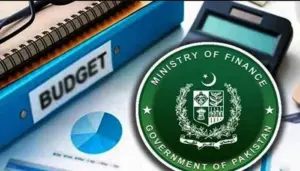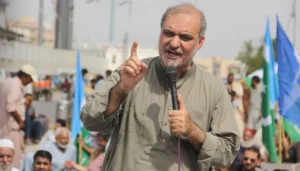GRASP Forms a Farmers Advisory Council

GRASP Forms a Farmers Advisory Council
KARACHI Nov 11,2021
Jointly with the progressive farmers and growers and agri-based SME experts Growth for the Rural Advancement & Sustainable Progress (GRASP) Sindh formally formed a provincial level Farmer Advisory Council (FAC).
The FAC comprised of the technical/legal/gender/policy experts, farmer associations, academia and research organizations and civil society and advocacy forums, on horticulture and Livestock Sectors to mobilize farmers and growers to facilitate and promote policy framework dialogue and agri-based SME competitiveness in Sindh.
A wide range of the progressive farmers and agri-based business organizations participated in the event, including Mehmood Nawaz Shah, Vice President Sindh Abadgar Board, Ms. Mukhtiar Naz Dharejo, a land lady, a progressive farmer and President Sindh Chamber of Agriculture Women wing, Mehboob ul Haq, Chief Sindh Enterprise Development Fund (SEDF), Mustafa Nangraj, Director Information Agriculture Extension, Ms. Khalida Salim from Federation of Chambers of Commerce and industries (FPCCI), Nabi Bakhsh Sathio, Senior Vice President, Sindh Chamber of Agriculture.
The provincial Lead GRASP Sindh, Ms Shabnam Baloch elaborated how the Advisory Council will have an advisory term of reference, with focus on the capacity building of the overall farming and agricultural entrepreneurship. It will improve the linkages between the service providers, ABSPs including researchers, training institutes.

The participants discussed that the FAC, a gender-inclusive body, containing small holder and women farmers, would build grower’s capacity on technical areas, with focus on policy development, business advocacy, they would participate in the PPDs and regulatory reform committee meetings.
A success story of Community Based Livestock Management in Disaster Affected Areas of Badin
The participants agreed that the FAC would be a joint advisory council for horticulture and livestock sectors, represented by government line departments, farmer organizations, civil society, academia, representative bodies, chambers, business associations and research institutions. GRASP Provincial Office would serve as FAC secretariat till the length of period; Sindh Agriculture University will take over for the sustainability of this initiative.
FAC will discuss the policy issues affecting farmers
Besides, FAC will discuss the policy issues affecting farmers in different ways (access to inputs, access to finance, access to information and extension services, yield per acre, access to innovative technologies etc.).
Suggest priority areas for policy interventions
The FAC would Suggest priority areas for policy interventions, to provide advisory platform for farmers and growers to improve and develop agri-business SMEs in target areas, assist GRASP in identifying capacities building needs of famers and service institutions (ABSPs) in livestock and horticulture sectors, encourage gender inclusiveness in all interventions in the sector, Promote market-oriented approach among famers and growers, Facilitate farmers and growers in access to financing facilities i.e. awareness raising activities, promote value additions in livestock and horticulture sectors in Sindh, review, analyze and recommend policy/regulatory framework improvements to concerned bodies, Advise and facilitate line government institutions and executing agencies in implementing relevant policies/laws/rules etc. relevant to agriculture sector.
Growth for the Rural Advancement & Sustainable Progress (GRASP) has already reviewed Sindh Agricultural policy, Livestock, Sindh Animal Compound Feed Act, Sindh Animal Disease Prevention and Control Act, FMD strategy, Sindh Dairy Sector Improvement Strategy, Provincial SME strategy, are already in process.
GRASP is a six-year (EU-funded with a budget €48,000,000.) project designed to reduce poverty in Pakistan by strengthening small-scale agribusinesses. GRASP is implemented by the International Trade Centre – the joint agency of the United Nations and the World Trade Organization – with active participation from local partners.






